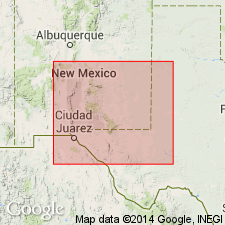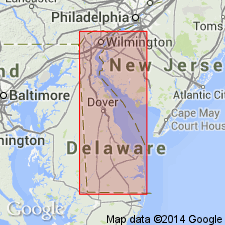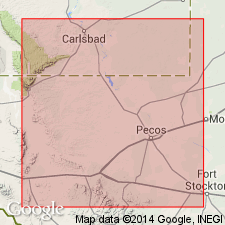
- Usage in publication:
-
- Lamar limestone member*
- Modifications:
-
- Original reference
- Dominant lithology:
-
- Limestone
- Sandstone
- AAPG geologic province:
-
- Permian basin
Summary:
Lamar limestone member of Delaware Mountain formation. Black calcareous bed, 25 to 30 feet thick, forming top member of Delaware Mountain formation in Delaware basin. Within the basin it is a carbonaceous and highly calcareous sandstone. As basin rim is approached the rock grades into limestone, and finally becomes a pale-gray limestone at base of the [Barrera] escarpment. In places it is overlain by additional Delaware Mountain beds, of limestone and sandstone, of variable thickness up to probably 100 feet. Underlies Castile anhydrite. This was previously called Frijole limestone by Blachard and Davis, from Frijole Post Office, but the similar dark limestone that occurs at Frijole Post Office is an older limestone, and the name Frijole limestone is therefore abandoned, to avoid confusion. Age is Permian [late Guadalupian; following Girty, 1909].
Type locality: escarpment north of Lamar Canyon, where canyon is crossed by Western Gas pipeline, about 15 mi due east of Guadalupe Point [Peak?], Delaware basin, western TX. Named from Lamar Canyon, southeast of Guadalupe Mountains, in northwest Culberson Co., western TX.
[Lithologic log given for Duncan No. 1 well, in sec. 30, T. 21 S., R. 30 E., Eddy Co., southeastern NM.]
Source: US geologic names lexicon (USGS Bull. 896, p. 1139); supplemental information (in brackets) from GNU records (USGS DDS-6; Denver GNULEX).

- Usage in publication:
-
- Lamar limestone member
- Modifications:
-
- Redescribed
- Dominant lithology:
-
- Shale
- AAPG geologic province:
-
- Permian basin
Summary:
Is the uppermost member of the Bell Canyon formation of the Delaware Mountain group. Occurs in subsurface of the northern Delaware basin [in Permian basin], in northwest Reeves, Loving, and northeast Culberson Counties, Texas, and in southern Eddy and Lea Counties, New Mexico. Redescribed to include calcareous shale along with black lime and calcareous sand. Is a persistent unit; thickness ranges from 30 to over 100 feet with thicker intervals occurring near basin margins. Overlies Trap subdivision (new, informal) and underlies Castile formation. Age is Permian (Guadalupian). Report includes generalized structure contour map.
Type gamma ray-sonic log presented but not located.
Source: Modified from GNU records (USGS DDS-6; Denver GNULEX).

- Usage in publication:
-
- Lamar Shale Member
- Modifications:
-
- Redescribed
- Dominant lithology:
-
- Shale
- AAPG geologic province:
-
- Permian basin
Summary:
Redescribed as Lamar Shale Member of the upper Bell Canyon Formation of the Delaware Mountain Group, in Delaware basin area [in Permian basin], southwest Texas and southeast New Mexico. Redescribed from Lamar lime [limestone] member to Lamar shale member owing to predominance of black, silty, calcareous shale, and in places, several beds of hard, black, very shaly limestone. Is overlain by banded anhydrite and limestone of the Castile Formation. Overlies Trap member (informal) of Bell Canyon Formation. Age is Permian (Guadalupian). Report includes stratigraphic chart and subsurface log correlations.
Source: Modified from GNU records (USGS DDS-6; Denver GNULEX).
For more information, please contact Nancy Stamm, Geologic Names Committee Secretary.
Asterisk (*) indicates published by U.S. Geological Survey authors.
"No current usage" (†) implies that a name has been abandoned or has fallen into disuse. Former usage and, if known, replacement name given in parentheses ( ).
Slash (/) indicates name conflicts with nomenclatural guidelines (CSN, 1933; ACSN, 1961, 1970; NACSN, 1983, 2005, 2021). May be explained within brackets ([ ]).

